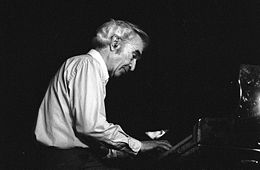 Jazz pianist and composer Dave Brubeck died Wednesday — a day before his ninety-second birthday.
Jazz pianist and composer Dave Brubeck died Wednesday — a day before his ninety-second birthday.
He was best known for his 1959 album “Time Out,” recorded by his band, the Dave Brubeck Quartet. With its complex and unusual beat patterns, many experts believe a new age for jazz was launched.
The inspiration for an American to use such odd time signatures came from the sounds and rhythms of the developing world, including Turkey, where Brubeck traveled. The most famous jazz song in history, “Take Five,” is on the album. The song, with its famous melody written by the band’s alto saxophonist Paul Desmond, was so catchy and became so widely known that it crossed over to Billboard’s pop charts in 1961. (Hear it below)
Music runs in Brubeck’s family. 4 of his 5 children have been professional musicians and his mother was a classically-trained pianist. After growing up in California, he began his college career studying to be a veterinarian and work with his father who was a cattle rancher. Eventually one of his college professors begged him to switch to musical studies, where he could follow his heart: “Stop wasting my time and yours.”
After graduating in 1942, Brubeck was drafted into the army and served overseas in George Patton’s Third Army. He was spared from service in the Battle of the Bulge when he volunteered to play piano at a Red Cross show; he was such a hit he was ordered to form a band. In early 1944, while still serving in the military, Brubeck met Paul Desmond, who became his long-time musical collaborator. Interestingly, Desmond donated all profits as songwriter of Take Five to the Red Cross.
 The Dave Brubeck Quartet was formed in 1951 and played hundreds of college campuses, nightclubs and theaters around the world until its disbanding in 1967. A high point for the group may have been their 1963 live album At Carnegie Hall.
The Dave Brubeck Quartet was formed in 1951 and played hundreds of college campuses, nightclubs and theaters around the world until its disbanding in 1967. A high point for the group may have been their 1963 live album At Carnegie Hall.
In the last half of his life, Dave was able to spend much more time with family and also to compose longer, extended orchestral and choral works, including oratorios, musicals and concertos. He continued performing throughout his life, even in 2011 at the age of 91. (Photo, left, by Roland Godefroy, 1990)
He didn’t take drugs or drink like other musicians. He joined the Catholic church in 1980, shortly after completing the Mass, To Hope.
Brubeck founded the Brubeck Institute with his wife, Iola, at their alma mater, the University of the Pacific in 2000. What began as a special archive, consisting of the pers onal document collection of the Brubecks, has since expanded to provide fellowships and educational opportunities in jazz for students, also leading to having one of the main streets on which the school resides named in his honor, Dave Brubeck Way.
onal document collection of the Brubecks, has since expanded to provide fellowships and educational opportunities in jazz for students, also leading to having one of the main streets on which the school resides named in his honor, Dave Brubeck Way.
In 2010, Clint Eastwood produced a documentary Dave Brubeck: In His Own Sweet Way about Brubeck for Turner Classic Movies to commemorate his 90th birthday in December 2010.
(WATCH a short video from his 90th birthday)



















